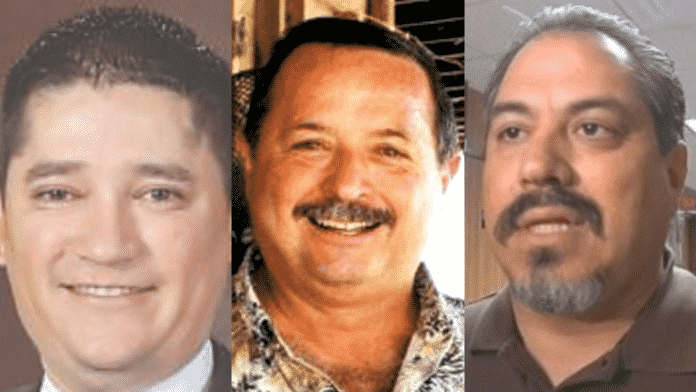A surge of the COVID-19 omicron variant has federal prosecutors concerned over the ability to safely hold a trial against three co-defendants in the Weslaco bribery case next month.
The bribery and wire fraud case against the three men — former Precinct 1 Hidalgo County Commissioner Arturo “A.C.” Cuellar, Weslaco businessman Ricardo Quintanilla and Daniel J. Garcia, an attorney from Rio Grande City — was declared “complex” soon after the 74-count superseding indictment against them was unsealed in April 2019.
That was due in large part to what prosecutors referred to as a “voluminous” amount of evidence that needed to be sifted through, including reams of documents, hours of cassette tapes containing recordings of public meetings, terabytes worth of digital data, as well as the statements from a number of potential witnesses.
Originally slated to go to trial in December 2019, the trial was delayed as attorneys on both sides continued to parse through those discovery materials. Just a few months later, however — in March 2020 — the COVID-19 pandemic began to sweep across the nation.
And now, nearly two years after it first began, new variants continue to sweep across the globe in an unabated merry-go-round, challenging the efficacy of current vaccines and further fueling concerns over courtroom safety.
“As this Court is likely aware, the incidence of COVID-19 has recently increased in the McAllen area and the country as a whole,” reads a Dec. 16 motion filed by prosecutors requesting a status hearing in the case.
“Notably, the recent rise of the omicron variant of the coronavirus raises significant concerns about the variant’s transmissibility and the current vaccines’ effectiveness against the variant,” it further reads.
With jury selection currently slated to begin Jan. 10, both sides want the court’s opinion on if and how a trial can safely be conducted as the omicron variant continues to outpace previous iterations of the virus.
Within weeks of the coronavirus reaching the Rio Grande Valley last year, the McAllen federal courthouse closed to the public. All jury trials were postponed indefinitely and the judicial system ground to a near halt.
Trials didn’t resume until this February — once vaccines renewed optimism over the possibility for people to again safely gather indoors.
Even then, however, those trials involved singular defendants and a limited number of witnesses. Jurors were seated throughout the jury box and gallery, where members of the public normally sit, and nearly everyone in the courtroom was required to wear a mask.
However, as the global rollout of those vaccines got off to an unequal start, new variants began to emerge in places where vaccination efforts were severely hampered by unavailability.
First came the delta variant, which emerged in India.
Then, just last month, epidemiologists in Botswana and South Africa — where as little as one-third of the population has been vaccinated — detected the omicron variant.
In just a matter of weeks, omicron has become the dominant strain in the United States, usurping delta, the once ubiquitous strain which had taken several months to overtake the country.
Furthermore, the new variant has shown an ability to evade vaccine protections and cause so-called “breakthrough” infections.
As of Monday, the omicron variant accounts for nearly three-quarters of all infections in the United States, according to the Centers for Disease Control and Prevention.
Doubling every one-and-a-half to three days, the new variant is causing skyrocketing infection rates not seen since the beginning of the pandemic.
But thus far, most infections have reportedly been mild — especially among those who have been fully vaccinated and who have also received a booster shot.
The first death attributed to the new variant was reported just this week in Harris County — an unvaccinated man in his 50s.
It’s becoming increasingly clear that the pandemic — which had begun to ebb just this summer — will be sticking around for a long while yet. And that reality seems to be informing some of the questions the attorneys in the Weslaco bribery case are hoping to have answered by U.S. District Judge Micaela Alvarez during next week’s hearing.
“[T]he parties seek guidance from the Court regarding … the number of alternate jurors the Court intends to appoint for jury service in the event of any in-trial Covid infections or exposures by jurors,” reads the motion for status hearing.
Both the prosecution and defense also want to know what the court plans to do if anyone tests positive for COVID-19 or becomes symptomatic during the trial, should it proceed under the current schedule.
“[W]hat protocols does the Court intend to implement in the event of a positive Covid test or Covid exposure… and whether that protocol will depend upon the vaccination status of the juror, attorney, or defendant,” the motion reads.
“[W]hat if any safety measures does the Court intend to implement with respect to social distancing and mask-wearing during trial…” it further reads.
So, to go on or to delay yet again? Those answers will come Tuesday morning.




